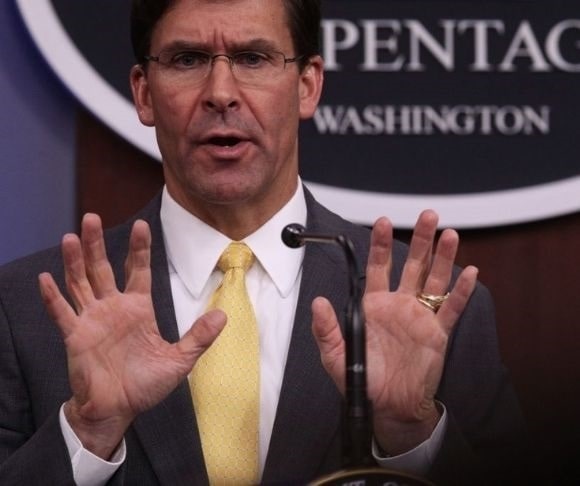Writing a “tell-all” book about one’s travails and triumphs while in public office seems to be a mandatory rite of passage these days. But be careful, in the zeal of the moment to get your juicy account in print, you may not use our nation’s secrets to which you were privy to make the manuscript more salable. Former Secretary of Defense Mark Esper is learning this lesson.

Mark Esper
(Photo by Greg Nash-Pool/Getty Images)
As required, he submitted the text of his soon-to-be-published book, “A Sacred Oath,” to the Department of Defense Office of Pre-publication and Security Review (DODOPSR) for approval. The bureaucrats at the Pentagon found parts of the book contained what they deemed classified information. According to Fox News, as many as 60 pages of Esper’s remembrance of his nearly two years as Secretary of the Army and 18 months as Secretary of Defense were redacted. Esper was offended and is suing the Pentagon in the U.S. District Court for the District of Columbia.
The Hill’s Mychael Schnell, in her coverage of the lawsuit, explained that Esper is suing because the Pentagon is “’improperly’ withholding ‘significant text’ from his upcoming memoir ‘under the guise of classification.’” He believes this is a matter of prior restraint. He claims that his manuscript “offers important details and new insights into many of the most controversial events” during his tenure.
Furthermore, his lawsuit accuses the Defense Department of “delaying, obstructing and infringing on his constitutional right to publish” the account of his service. As the former defense chief said in his public statement issued Nov. 28, “For nearly six months, I patiently waited for the formal process, only to have my unclassified manuscript arbitrarily redacted without clearly being told why.”
Defending the DODOPSR, the Assistant to the Secretary of Defense for Public Affairs John Kirby explained that he knew about Esper’s concerns, adding, “As with all such reviews, the Department takes seriously its obligation to balance national security with an author’s narrative desire.” That is bureaucrat-speak for the Defense Department will not change its position, so sue away.

Lloyd Austin
(Photo by Chip Somodevilla/Getty Images)
Again, as The Hill reported, Esper wrote a letter to Lloyd Austin, the current defense secretary, expressing his displeasure with the review office forcing changes to the manuscript. Esper noted that Pentagon bureaucrats did suggest that he meet with people from the Office of the Under Secretary for Policy (OUSDP) to work out some “compromise language,” since OUSDP is the origin of much of the disputed text. But the former defense secretary was having none of that. He responded that he “should not be required to change my views, opinions, or descriptions of events simply because they may be too candid at the time for normal diplomatic protocol.”
Esper argued many of the references the review office wanted redacted were already in the public domain. Unfortunately for former government officials publishing a book, this argument is seldom compelling. Often, information is classified not for the content of the text but rather for sensitivities about the person who made the statements or for the methods by which the author obtained the text. In this case, the Pentagon did not provide reasons for the redactions.
In a review of the Esper prior restraint lawsuit, First Amendment Watch, a newsletter published by New York University, explained, “Esper had a contentious relationship with former President Donald Trump and said that his memoir was an attempt to provide details about ‘an unprecedented time of civil unrest, public health crises, growing threats abroad.’” The memoir also included what Esper characterized as a White House attempting to work around the Constitution. Keep in mind Trump did fire Esper following his 2020 election defeat. Many would see Esper’s account of his time in the previous president’s administration as payback for being let go.
On the other hand, pundits inclined toward cynicism are likely to see mischief in the Pentagon’s handling of Esper’s manuscript. In fact, according to The Hill, the former Pentagon chief raised the specter of the reviewers purposely leaking portions of his work to, as Esper put it, “undermine the impact it would have had were it to first appear in the published version of ‘A Sacred Oath.’” On reflection, while this appeals as a conspiracy theory, the Biden Defense Department probably doesn’t merit that much credit.
The views expressed are those of the author and not of any other affiliation.
~ Read more from Dave Patterson.




